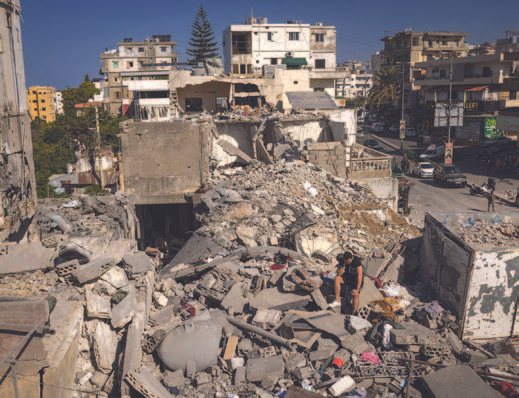
By Liam Stack and Christina Goldbaum
On Wednesday, Israel’s military advised inhabitants of Baalbek in eastern Lebanon to evacuate, indicating an escalation in its offensive against Hezbollah positions beyond southern Lebanon.
Baalbek, home to approximately 80,000 residents prior to Israel’s intensified assaults against Hezbollah this month, is a vital urban center in the Bekaa Valley, renowned for its impressive Roman ruins and significant Hezbollah influence.
Despite the group’s local popularity, Baalbek has primarily avoided Israeli airstrikes. The choice to target Baalbek, one of two urban zones recently attacked by Israel, indicates an expansion of their campaign against Hezbollah.
The evacuation alerts were issued as diplomatic attempts for a ceasefire resumed, according to three unnamed officials familiar with the discussions surrounding the sensitive negotiations.
While no consensus has been established, Israel is advocating for a deal that would allow Hezbollah several weeks to withdraw its forces from the Israel-Lebanon border, enabling Lebanon’s official military— which has been sidelined by Hezbollah in the southern region for the last 20 years— to take control, as disclosed by two of the officials.
Israel seeks assurances that it can launch an invasion of Lebanon should Hezbollah fail to evacuate swiftly, according to the two officials.
Avichay Adraee, the Israeli military’s spokesperson for Arabic media, shared a map online on Wednesday depicting Baalbek and two nearby towns, Ain Bourday and Douris, highlighted in red as a danger zone, along with three evacuation routes approved by the Israeli military.
“The IDF will take decisive action against Hezbollah objectives in your city and villages and does not intend to harm you,” Adraee noted, referring to the Israel Defense Forces. “For your protection, you must evacuate your homes immediately and move outside the city and villages.”
This evacuation notice follows Israeli airstrikes that reportedly killed at least 60 individuals in the Bekaa area, including the city and surrounding rural regions, according to Lebanese officials. The Health Ministry of Lebanon indicated that no less than 58 others suffered injuries in the strikes.
The fields and communities surrounding Baalbek have experienced numerous airstrikes in recent weeks, leaving many towns largely abandoned. Earlier this month, Ibrahim Bayan, a deputy mayor in Baalbek, noted that approximately two-thirds of the city’s population had evacuated due to fear.
As evacuation alerts reached the residents of Baalbek via text message late Wednesday morning, a palpable panic spread throughout the city, Bayan reported.
“People are in a state of frenzy,” Bayan stated. “They are darting around and colliding with each other, like disoriented chickens. They have no clarity on what to do or where to head.”
Within moments, the streets became crowded with residents packing their valuables into plastic bags, securing their homes, and closing metal grates over shop entrances, he said. As they filled their cars, people shouted to each other, trying to find the safest exit route from the city.
Others chose to stay in the city, uncertain about their destination or means of transportation.
Baalbek is situated in one of Lebanon’s least developed areas, and many locals lack the resources to flee, according to some residents.
“Gas stations are shut down, but even if they were operational, people wouldn’t have the funds to fill their gasoline tanks,” remarked Mahmoud Zikra, a Baalbek resident who chose to remain at home. “There are no vans or taxis available — and even if there were, no one could afford them.”
The military’s warning encompassed a village in Baalbek’s southern suburbs that connects the city to the region’s primary highway, hindering a typical exit route for locals attempting to depart the valley.
Hezbollah’s newly appointed leader, Naim Qassem, delivered his inaugural televised address on Wednesday afternoon, just one day after assuming the role. He succeeded Hassan Nasrallah, the group’s long-standing leader who was killed by Israel last month.
During the speech, made as Hezbollah launched a series of rockets into northern Israel, Qassem lauded his predecessor and asserted that Hezbollah “will persist in executing the war strategy established by him.”
Clashes between Israeli forces and Hezbollah continued in other parts of Lebanon. On Wednesday, the Israeli military announced that it had targeted over 100 locations across the country in the preceding 24 hours, including a rocket launch site involved in a lethal attack on the Israeli town of Ma’alot-Tarshiha on Tuesday. The military also claimed to have eliminated numerous Hezbollah fighters in “limited, localized, and targeted assaults.”
Adraee noted that one of the fighters killed was Mustafa Ahmed Shehadi, who he identified as a prominent commander within the group’s elite Radwan Force. Hezbollah has not confirmed this assertion.
Shehadi met his end in a strike on Nabatieh, a sizable town in the south, according to Adraee. On Wednesday, evacuation alerts were also disseminated for eight small towns surrounding Nabatieh, urging residents to move north of the Awali River.
On Tuesday night, an Israeli airstrike resulted in at least 10 fatalities in the coastal city of Sidon, according to the national news agency of Lebanon. The report indicated that at least 36 others sustained injuries. Recently, attacks on Sidon, one of Lebanon’s largest urban centers, and its neighboring regions had been infrequent.
Hezbollah claimed its fighters had engaged Israeli troops in recent days near the border town of Kfar Kila and the mountainous town of Khiam, which is notably recognized as the former site of an Israeli-run prison camp during its two-decade occupation of southern Lebanon.
After Israel’s withdrawal in 2000, the camp became a museum by the Lebanese government, although it was subsequently destroyed by an Israeli airstrike during the 2006 conflict in Lebanon.
Hezbollah’s assertions could not be independently verified. The national news agency reported that Israeli soldiers near Khiam were “attempting to infiltrate the town amid heavy fire” on Wednesday, with the Israeli air force conducting multiple strikes in the vicinity.
